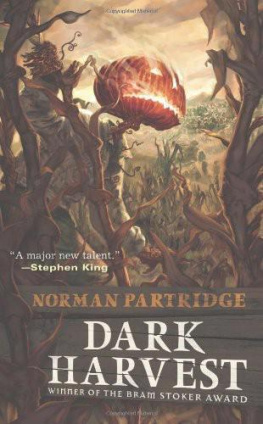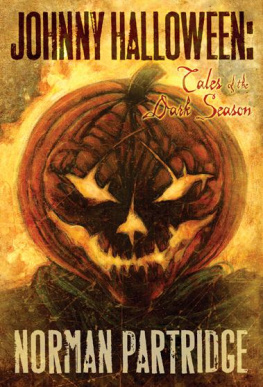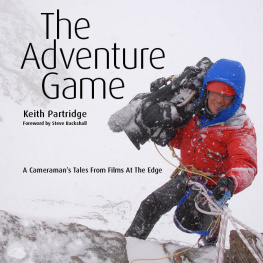Norman Partridge - Slippin' into Darkness
Here you can read online Norman Partridge - Slippin' into Darkness full text of the book (entire story) in english for free. Download pdf and epub, get meaning, cover and reviews about this ebook. genre: Science fiction. Description of the work, (preface) as well as reviews are available. Best literature library LitArk.com created for fans of good reading and offers a wide selection of genres:
Romance novel
Science fiction
Adventure
Detective
Science
History
Home and family
Prose
Art
Politics
Computer
Non-fiction
Religion
Business
Children
Humor
Choose a favorite category and find really read worthwhile books. Enjoy immersion in the world of imagination, feel the emotions of the characters or learn something new for yourself, make an fascinating discovery.

- Book:Slippin' into Darkness
- Author:
- Genre:
- Rating:4 / 5
- Favourites:Add to favourites
- Your mark:
- 80
- 1
- 2
- 3
- 4
- 5
Slippin' into Darkness: summary, description and annotation
We offer to read an annotation, description, summary or preface (depends on what the author of the book "Slippin' into Darkness" wrote himself). If you haven't found the necessary information about the book — write in the comments, we will try to find it.
Slippin' into Darkness — read online for free the complete book (whole text) full work
Below is the text of the book, divided by pages. System saving the place of the last page read, allows you to conveniently read the book "Slippin' into Darkness" online for free, without having to search again every time where you left off. Put a bookmark, and you can go to the page where you finished reading at any time.
Font size:
Interval:
Bookmark:
Slippin' Into Darkness
Norman Partridge
ONE
APRIL 8, 1994
DARK
April is the cruelest month, breeding
Lilacs out of the dead land, mixing
Memory and desire, stirring
Dull roots with spring rain.
- T.S. Eliot, The Waste Land12:03 A.M.
Theres the windup, and heres the pitch: a beer bottle flew through the night air and exploded against a granite cross. Shards of broken glass knifed the soft earth. Cold liquor rained down on clipped blades of cemetery grass, shivered, and formed fat tears.
The pitcher stood on the mounded grave of an insurance salesman who had expired in 1992, exactly sixty feet, six inches from the granite cross. He smiled, appreciating his skill. Half in the bag, but he was still putting them over straight and hard with a strong arm. Dead solid strikes, one after another, each bottle shattering against the center of the granite crosspiecethe cold hard strike zone.
Graveyard baseball was the name of the game. No men on base. Rounded mounds for first, second, and third; the graves of a telephone solicitor, a war hero, and an infant born without a brain. Not exactly a million-dollar infield, but the infield didnt matter when the pitches were flying straight and true. Every bottle right on target. A cancer-serious no-hitter.
The pitcher sighed, concentrating on the cross. He was alone. No men anywhere, but that was to be expected. This was a pitchers game, a hurlers midnight solitaire. Graveyard baseball was a game that disallowed self-deception and required a certain amount of imagination. After all, a granite cross couldnt really swing a bat, so imagination was truly a necessity.
Unless the pitches were flying straight and true. Unless the bases remained empty, as they were now. Then the game didnt require any imagination at all.
Sweat beaded on the pitchers forehead, soaking the band of a Hogan Spartans baseball cap that had spent eighteen years lost in one closet or another. His arm would ache like hell tomorrow. Eighteen years had passed since he had last held a beer bottle in his hand and faced an implacable granite batter. But tomorrows pain didnt matter. Tomorrow didnt matter at all, because tonight it was April, and it was opening day, and the pitchers mind was deep in the pit of memory.
Memories that had brought him to this place.
Memories of a girl.
The pitcher opened another bottle-the dry hiss of released pressure was as cold as the stunted stone forest that surrounded him-and he drank deeply.
The windup. The pitch.
The crackle of exploding glass. The smell of beer and a distant ocean breeze and an unseasonably warm April night and clipped cemetery grass.
A gentle rain of alcohol brewed from pure Rocky Mountain spring water.
A wet granite cross reflecting the gleam of the moon.
APRIL L OUISE DESTINO
April Destino had brought the pitcher here tonight. She was dead, and he was one of her boys. He wasnt one of the boys of summer, even though he wore a baseball glove. No, he was one of the boys of April.
Toeing the mound, the pitcher imagined carrion worms doing their work on the dead insurance man six feet beneath his battered cleats. He slammed another bottle into the webbing of his glove. A puff of dust rose from cracked leather. He twisted off the cap and drank. The windup.
A flashlight beam cut at the pitchers eyes. He turned away quickly, as if acid had been flung at his face, but the tattered bill of his baseball cap couldnt protect him from the unyielding glare.
The pitch.
The sight: the flashlight beam too bright, too strong, somehow able to pull the bottle off course so that it sailed low and outside under the left arm of the cross that bore Aprils name. The sound: bottle skidding over grass; brewed Rocky Mountain spring water sloshing, spattering alcohol tears.
Hey! What the hell do you think youre doing?
The pitcher didnt answer. The flashlight beam was dry ice on his face, and his eyes burned and his pupils shut down to nothing, and then his eyes screamed.
A muscle twitched in the pitchers neck. He started to get a little angry. He bit his lower lip, and then his tongue went to his upper lip and licked at a trickle of sweat.
Goddammit! You cant sneak into the cemetery in the middle of the night and do this shit! Youre in trouble, asshole! Big trouble!
The shouting man was close now. Short and fat and staring up from under the pitchers chin, his little fatman voice too loud and incredibly self-righteous.
The man was an umpire ready to argue balls and strikes.
The pitcher didnt say a word.
The umpire bumped his chest against the pitchers.
The windupbut this time the pitchers hand was empty and balled into a fist.
The pitch: knuckles cracked against the umpires jaw, and he shut up, and he fell down.
The pitcher turned off the mans flashlight and welcomed the darkness. In a moment his eyes adjusted, and he picked up the thing he had brought with him in place of a bat. He stood over the umpire, not looking down, looking instead at the playing field, the mounded bases, the baselines that were nothing but fugitive shards of moonlight. A marble Christ waved at him from centerfield, daring him. It was an unseasonably warm April evening, but in the pitchers mind it was an April afternoon and the ghost of a morning fog born on Pacific tides could still be tasted in the air.
A thousand echoes of a thousand lives haunted this place. Crashing waves washed the silence. Foghorns sang baritone and time-clocks clicked a staccato rhythm and a shipyard quitting whistle played sharp counterpoint. Blue-collar fathers shouted encouragement to boys in dirty uniforms. Worn cleats bit into dusty earth.
And then came the single echo the pitcher wanted to hear: the musical voice of a cheerleader begging him to put one over the fence.
It was not a bat that he held in his big hands, but in his mind he imagined that it was.
The crack of the bat. He wanted to hear it.
The roar of the crowd. He could hear it still.
April was here, asleep in the ground.
And it was opening day.
1:12 A.M.
Marvis Hanks, Junior, climbed the stairs that led from the basement to the foyer of his house. His long fingers were interlocked so that his hands made a shelf at crotch level; a stack of videotapes was scissored between his hands and the point of his chin, and consequently his eyes were trained on the ceiling instead of the stairs. Normally Marvis would have eschewed such daredevil activity, but he had been climbing these stairs for thirty-four of his thirty-five years. Each step was completely familiar.
He breathed a short sigh of relief as he left the staircase. The heels of his expensive Bally loafers clacked smartly against the white pine floor in the foyer. Marvis had lived alone since the death of his parents, both of whom had succumbed while he was in college, so the whisper of his sigh and the tapping of his heels were the only sounds in the house.
The only sounds, until he passed the living room.
A subdued giggle jolted Marvis mid-step. The crowning tape in his carefully balanced stack twisted under his chin. The videos toppled from his grasp like so many oversized dominos and clattered to the floor.
The giggling sound came again. Moonlight washed the living room from an Anderson bay window, the sash bars casting a dark net over the brass-and-mahogany pool table that dominated the room.
And lying on the pool tablesomething, or someone.
Marvis squinted. His green eyes zeroed in on a tangle of crisp blonde hair framed by a square of black shadow. The giggles spilled into full laughter. A pair of lips were trapped in the black shadow frame.
Font size:
Interval:
Bookmark:
Similar books «Slippin' into Darkness»
Look at similar books to Slippin' into Darkness. We have selected literature similar in name and meaning in the hope of providing readers with more options to find new, interesting, not yet read works.
Discussion, reviews of the book Slippin' into Darkness and just readers' own opinions. Leave your comments, write what you think about the work, its meaning or the main characters. Specify what exactly you liked and what you didn't like, and why you think so.







